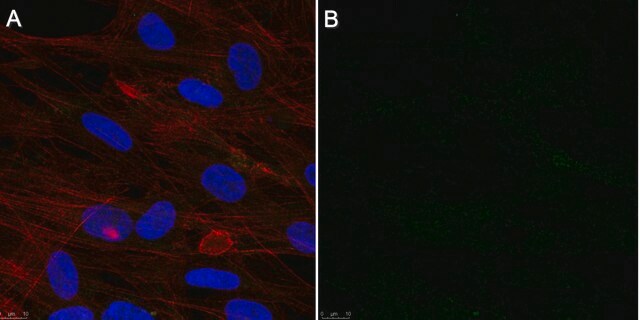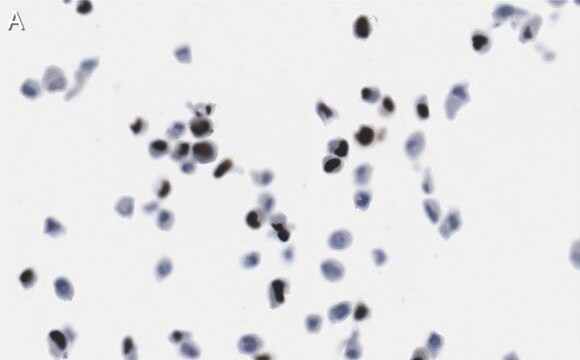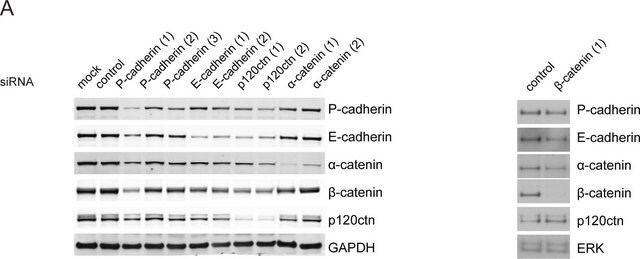MAB8140
Anti-Cytomegalovirus Antibody, early, clone 5A8.2
clone 5A8.2, Chemicon®, from mouse
Synonym(s):
CMV
Sign Into View Organizational & Contract Pricing
All Photos(1)
About This Item
UNSPSC Code:
12352203
eCl@ss:
32160702
Recommended Products
biological source
mouse
Quality Level
antibody form
ascites fluid
clone
5A8.2, monoclonal
species reactivity
human
manufacturer/tradename
Chemicon®
technique(s)
immunofluorescence: suitable
immunohistochemistry: suitable
immunoprecipitation (IP): suitable
western blot: suitable
isotype
IgG1
shipped in
wet ice
Specificity
Reacts with Immediate Early 2 protein (IE2) and its fragments. Recognizes a can epitope near the carboxy-end that includes an epitope found in IE2 86, IE2 60 and IE2 40. In western blot recognizes proteins at apparent molecular weights of 86, 68-72, 55 and 38 kD. Can detect CMV infection 1 hour post-infection exhibiting nuclear and/or intranuclear inclusion staining with reaches peak intensity at 3 hours.
With CMV the antigens expressed at different times are listed as:
Immediate Early (alpha gene expression): those antigens expressed at 3-12 hrs post-infection generally involved in Transcription such as 72kD major phosphoprotein and a few other other antigens at 60 - 80kD.
Early Antigen (beta genes) a.k.a. Delayed Early or Intermediate Early: expressed at 12-24hrs post-infection. Generally enzymes and one virion structural gene preceding viral DNA synthesis.
Late Antigen (gamma genes): expressed at 36-48hrs post-infection. Generally structural proteins. Major protein = 55kD
With CMV the antigens expressed at different times are listed as:
Immediate Early (alpha gene expression): those antigens expressed at 3-12 hrs post-infection generally involved in Transcription such as 72kD major phosphoprotein and a few other other antigens at 60 - 80kD.
Early Antigen (beta genes) a.k.a. Delayed Early or Intermediate Early: expressed at 12-24hrs post-infection. Generally enzymes and one virion structural gene preceding viral DNA synthesis.
Late Antigen (gamma genes): expressed at 36-48hrs post-infection. Generally structural proteins. Major protein = 55kD
Immunogen
Affinity purified antigen from MRC-5 cells infected with CMV AD169 (ATCC).
Epitope: early
Application
Anti-Cytomegalovirus Antibody, early, clone 5A8.2 detects level of Cytomegalovirus & has been published & validated for use in IF, WB, IH & IP.
Immunochemistry.
IFA at 1:3,000-1:6,000 on acetone fixed cells.
Does not work with paraffin embedded tissue sections.
Dilute with buffer pH 7.4-7.6 to desired working volume.
For extensive dilution, protein containing or other stabilizing medium should be used.
Final working dilutions must be determined by end user.
IFA at 1:3,000-1:6,000 on acetone fixed cells.
Does not work with paraffin embedded tissue sections.
Dilute with buffer pH 7.4-7.6 to desired working volume.
For extensive dilution, protein containing or other stabilizing medium should be used.
Final working dilutions must be determined by end user.
Physical form
Format: Purified
Purified ascites. Supplied in PBS buffer, pH 7.4. Contains 0.01% sodium azide and carrier protein. Has been sterile filtered.
Legal Information
CHEMICON is a registered trademark of Merck KGaA, Darmstadt, Germany
recommended
Product No.
Description
Pricing
Storage Class Code
10 - Combustible liquids
WGK
WGK 2
Flash Point(F)
Not applicable
Flash Point(C)
Not applicable
Certificates of Analysis (COA)
Search for Certificates of Analysis (COA) by entering the products Lot/Batch Number. Lot and Batch Numbers can be found on a product’s label following the words ‘Lot’ or ‘Batch’.
Already Own This Product?
Find documentation for the products that you have recently purchased in the Document Library.
The IE2 60-kilodalton and 40-kilodalton proteins are dispensable for human cytomegalovirus replication but are required for efficient delayed early and late gene expression and production of infectious virus.
White, Elizabeth A, et al.
Journal of virology, 81, 2573-2583 (2007)
Human cytomegalovirus early protein pUL21a promotes efficient viral DNA synthesis and the late accumulation of immediate-early transcripts.
Fehr, AR; Yu, D
Journal of virology null
Development of cell lines that provide tightly controlled temporal translation of the human cytomegalovirus IE2 proteins for complementation and functional analyses of growth-impaired and nonviable IE2 mutant viruses.
Sanders, RL; Clark, CL; Morello, CS; Spector, DH
Journal of virology null
Internal deletions of IE2 86 and loss of the late IE2 60 and IE2 40 proteins encoded by human cytomegalovirus affect the levels of UL84 protein but not the amount of UL84 mRNA or the loading and distribution of the mRNA on polysomes.
Sanders, Rebecca L, et al.
Journal of virology, 82, 11383-11397 (2008)
Blair L Strang et al.
PloS one, 13(7), e0201321-e0201321 (2018-07-27)
Chemogenomic approaches involving highly annotated compound sets and cell based high throughput screening are emerging as a means to identify novel drug targets. We have previously screened a collection of highly characterized kinase inhibitors (Khan et al., Journal of General
Our team of scientists has experience in all areas of research including Life Science, Material Science, Chemical Synthesis, Chromatography, Analytical and many others.
Contact Technical Service



